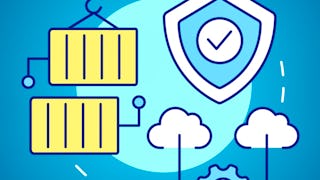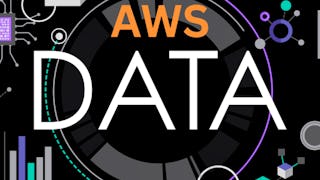The fundamental-level course is typically designed for individuals with a basic understanding of data storage and processing concepts but little to no prior experience with building data lakes on AWS specifically. After a brief introduction to Data Lakes, we'll introduce data ingestion, cataloging and preparation, concluding with an overview of querying data with Amazon Athena. The course will continue with an AWS Lake Formation overview, including a hands-on lab where you'll build a data lake. We'll then introduce data processing and analytics leveraing AWS Glue before diving into automated data lake creatiokn using Lake Formation blueprints. Finally, we'll close with Modern Data Architectures on AWS with a lab that covers publishing and consuming data products as a service.
Enjoy unlimited growth with a year of Coursera Plus for $199 (regularly $399). Save now.

Building Data Lakes on AWS
This course is part of AWS Cloud Solutions Architect Professional Certificate


Instructors: Rafael Lopes
38,164 already enrolled
Included with
(303 reviews)
Recommended experience
What you'll learn
Apply data lake methodologies in planning and designing a data lake.
Describe the components and services required for building an AWS data lake.
Compare the ways data can be ingested, stored, and transformed in a data lake.
Explain how to secure a data lake with appropriate permissions.
Skills you'll gain
- Data Processing
- Data Lakes
- Data Science
- Data Storage
- Amazon S3
- Data Infrastructure
- Machine Learning
- Data Visualization
- Query Languages
- AWS Identity and Access Management (IAM)
- Amazon Web Services
- Data Warehousing
- Data Engineering
- Data Architecture
- Data Transformation
- Data Management
- Data Import/Export
- Data Governance
Details to know

Add to your LinkedIn profile
7 assignments
See how employees at top companies are mastering in-demand skills

Build your Data Analysis expertise
- Learn new concepts from industry experts
- Gain a foundational understanding of a subject or tool
- Develop job-relevant skills with hands-on projects
- Earn a shareable career certificate from Amazon Web Services

There are 6 modules in this course
This module provides an overview of data lakes, their purpose, and how they differ from data warehouses. It also covers the components and architectures involved in data lakes.
What's included
5 videos1 reading2 assignments1 plugin
This module focuses on the processes of ingesting data into a data lake, cataloging the data, and preparing it for analysis. It covers topics such as data lake storage, data ingestion methods, crawling and cataloging data, data formatting, partitioning, compression, and querying data with Amazon Athena.
What's included
10 videos1 reading1 assignment1 plugin
This module introduces AWS Lake Formation, a service that helps build and manage data lakes on AWS. It covers the basic permission model, and provides an overview of the service’s features and capabilities.
What's included
3 videos1 reading1 assignment1 app item
This module covers data transformation techniques and tools like AWS Glue for processing and analyzing data in the data lake. It includes hands-on demos and a technical talk on Glue and Athena Federated Queries.
What's included
7 videos1 assignment1 discussion prompt
This module explores advanced features and configurations of AWS Lake Formation, including blueprints, workflows, and fine-grained access control. It also covers data visualization with Amazon QuickSight.
What's included
5 videos1 assignment1 app item
This module introduces the concept of modern data architecture and its implementation on AWS. It covers data movement scenarios, data sharing models, and relevant readings.
What's included
6 videos3 readings1 assignment1 app item1 plugin
Earn a career certificate
Add this credential to your LinkedIn profile, resume, or CV. Share it on social media and in your performance review.
Instructors


Offered by
Explore more from Data Analysis
 Status: Preview
Status: Preview Status: Free Trial
Status: Free TrialDeepLearning.AI
 Status: Free Trial
Status: Free Trial Status: Free Trial
Status: Free TrialLearnKartS
Why people choose Coursera for their career




Learner reviews
303 reviews
- 5 stars
80.52%
- 4 stars
13.20%
- 3 stars
3.63%
- 2 stars
0.99%
- 1 star
1.65%
Showing 3 of 303
Reviewed on Feb 23, 2025
Great must learn course of data scientist professional.
Reviewed on Jul 11, 2022
It is a good one. However, I had some problems accessing the exercises...
Reviewed on Jul 31, 2022
thank for such nicely design course for learning and handson
Frequently asked questions
Yes, you will need a credit card to activate your AWS account.
Learners enrolled in the Verified Certificate path will receive a certificate upon successful completion of the course.
This course has discussion groups aligned to each week of the course. We encourage learners to ask questions or offer suggestions and feedback. AWS Instructors will monitor the discussion groups to answer questions specific to the exercises and topics covered in the course.
More questions
Financial aid available,



